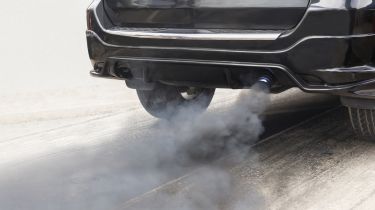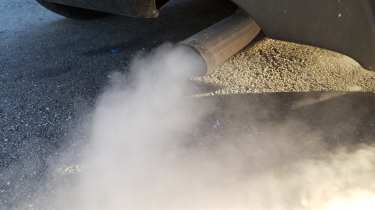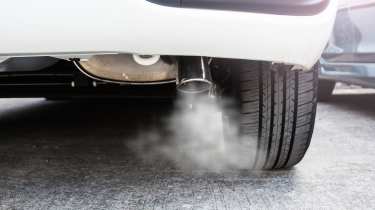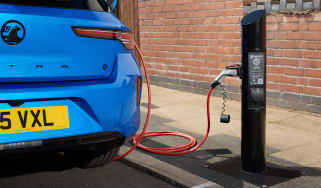Car exhaust smoke: what do the different kinds and colours of smoke mean?
Is your car suffering from a smoky exhaust? Our troubleshooting guide tells you what could be the cause and what you need to do to fix it

Car exhaust smoke can come in various different colours and thicknesses, all of which can be an indication of your engine's overall health and what’s going on under the bonnet. Car exhaust smoke can be black, blue, grey or white, and is usually nothing to worry about, but knowing what the colours mean can help diagnose any serious mechanical problems. Don’t worry though, as our guide to car exhaust smoke is here to help.
There are a number of factors that could cause your car exhaust to emit smoke while the car is idling or under acceleration. White smoke or condensation is often emitted when the weather is cold or the car has been sitting in the rain for a period of time. Black smoke could be the result of a clogged diesel particulate filter which is just clearing itself out. Worst of all, it could be blue smoke which is an indication of a head gasket failure.
So which kinds of visible exhaust emissions are trouble-free and which should cause alarm? Read on to find out everything you need to know.
Diagnosing a smokey car exhaust: what to look for
When diagnosing the cause of car exhaust smoke, the first step is to identify exactly when the smoke is coming out. If it only appears when you are accelerating, that might indicate a different problem than if it only appears when the car is stationary, or is constant whenever the engine is running.
Once you've worked out when the smoke occurs, next you need to try and determine what kind of smoke it is and where it’s coming from. All you need to do is ask yourself the following questions:
- Is the exhaust smoke white, grey, or with a hint of blue tinge to it? Or is it thick and black?
- Does the smoke evaporate as soon as it's in the air? Or does it linger and come with an unpleasant burning smell?
- If it's black smoke, then does it leave soot on the road under the exhaust tip when the car is stationary?
The main causes of smoke from an exhaust can vary depending on your car, its fuel type and its mechanical condition. Diesel cars can be particularly liable to a smokey exhaust, but if your car is well maintained and serviced regularly, then any visible emissions from your exhaust are unlikely to be anything of concern, but it is well worth checking anyway.

You might find that the smoke isn’t actually smoke at all and is in fact water vapour which is condensing on a cold or wet day, which is fairly normal and to be expected.
The real issue is with cars that have been poorly maintained, as smoke from the exhaust could be a clear sign of neglect. This can be a useful clue when buying a used car, because a smoking exhaust can be a tell-tale sign of underlying problems, particularly if the service history is incomplete.
The smoke you see can be caused by different things, depending on whether your car has a petrol or diesel engine. If you drive a hybrid car, you too could see your exhaust putting out something that you might not be prepared for.
We've separated the different kinds of smoke you'll come across to help you quickly identify which problem causes which smoke. We’ve also indicated whether the problem will need to be fixed and whether it's a costly repair. The summaries for each exhaust smoke type are directly below but you can scroll down the page for a full explanation.
What different colours of exhaust smoke could mean
White smoke from the exhaust: This could be steam caused by condensation in the exhaust pipe or a more serious issue caused by an engine coolant leak. Excessive amounts of white smoke could indicate head gasket failure. Condensation is fairly common, especially in hybrid cars due to the combustion engine being used less, but white smoke from condensation should disappear once the engine is up to temperature.
Blue smoke from the exhaust: Oil is being burned. There are a number of potential causes for blue smoke, with the more severe being worn valve seals, piston rings or turbochargers. If your car is emitting blue smoke, you should get your engine inspected by a professional mechanic.
Grey smoke from the exhaust: This could be excess oil, a PCV valve failure or a transmission fluid leak on automatic cars. This will need to be investigated by a professional.
Black smoke from the exhaust: In a petrol car, this suggests too much fuel is being burned and could be a sign of air filter or fuel injector problems. In diesel cars it’s more likely to be soot build-up or the diesel particulate filter cleaning itself. If the DPF is clogged or cleaning itself, a dashboard warning light may illuminate to indicate this. A longer drive, ideally on a motorway to enable higher speed and revs, should give the filter a chance to clean itself, resolving the problem.
White smoke from an exhaust
The most common form of smoke from an exhaust isn't actually smoke at all. When a cold engine is started, it soon begins to heat up, and a byproduct of this is water vapour. This creates condensation within the exhaust system, which then turns into steam as temperatures rise within the engine and exits through the exhaust.
Problems can occur if you only use a car for short journeys, meaning that the exhaust system doesn't get completely warm all the way to the exhaust tip. If condensation forms in the system and doesn't clear, it can corrode the inside of the bare steel of the exhaust, leading to rust that could develop into exhaust leaks and blowing from the system – where exhaust gases leak out. A blowing and leaky exhaust could lead to an MOT test failure due to incorrect readings on the emissions test.
If you drive a hybrid car, especially a plug-in hybrid car, you’re likely to also see white smoke or condensation coming from the exhaust pipe. This is because hybrid cars don’t always fire up the engine straight away, which can delay you from seeing steam coming from your exhaust. Depending on how much battery range you drive on, you could see steam from your exhaust well into your journey. But this again is nothing to worry about, it's just a delayed reaction to the same heating process mentioned above.
If the white smoke coming from the exhaust is thicker and doesn't stop even when the car is up to working temperature, it is still steam, but also an indicator of a more severe issue that will be caused by your car's coolant leaking into the engine. This can be caused by a failed head gasket (the seal between the engine block and the head that sits on top), which could be a pricey repair, but not as expensive as needing to repair a cracked engine block or cylinder head.
If the leak is minor, but won't go away, then it will need repairing because leaving it will only make matters worse. It could even result in engine failure, which will be a very expensive repair. This could mean replacing the engine entirely, although if it's too expensive to do this, the car will probably be written off.
Blue smoke from an exhaust
If you see blue smoke from your car's exhaust, it will probably be accompanied by a burning smell. It means that there is oil entering the system somewhere. Engine oil is designed to lubricate moving parts, and it doesn't enter the fuel system if a car is running properly.

If your car has been serviced recently - or you've serviced it yourself - it could be that too much oil has been put back into the system, and this excess oil is burning off. If the smoke stops after a while, then there's no problem. Another cause could be that some oil has spilled onto the exhaust while being topped up, only to be heated and burnt off by the hot exhaust while you're driving.
If the blue smoke is happening in a car that's covered a high mileage, it might mean that the valve seals or piston rings are worn, which is allowing oil to enter the fuel system around the cylinders or valves. The remedy for this is new seals all round, and as you'd expect, this is a costly job as it means taking the engine apart to get to them.
Burning oil will also mean your car is using more oil than normal. You should be checking your oil levels every 1,500 to 2,000 miles anyway, but if you are seeing blue smoke from your exhaust, you should check the level more frequently so you can keep an eye on any oil loss. If the oil loss is minor, then simply topping up with oil will be easier than repair, as long as the oil loss doesn't get any worse.
If you're seeing blue smoke from a turbocharged car, then another reason for it could be a worn-out turbocharger. This will need rebuilding or replacing, which is also an expensive job.
Grey smoke from an exhaust
Like blue smoke, grey smoke could be a sign of excess oil burning somewhere in the engine, or a turbo needing attention, but there are other causes. One might be a faulty PCV valve. PCV stands for Positive Crankcase Ventilation, and this device is one of the most basic forms of emissions control, as it draws unburnt fuel back from the lower part of the engine to the top.
This helps reduce vehicle emissions, especially when the engine is cold, but over time it can wear out. Smoke caused by PCV failure will look serious, but PCV repair is a relatively straightforward job when compared to some of the other causes on this list.
If you drive a car with an automatic gearbox, then another reason for grey smoke might be that transmission fluid is being drawn into the engine through a leak in the system. If this is the case, this could be a costly repair and will need urgent attention from a professional mechanic.
Black smoke from an exhaust
Like the other types, there are also different causes of black smoke, and one of the main factors to take into account is whether your car is petrol or diesel-powered.
In a petrol car, black smoke is a sign that too much fuel is being burnt. To remedy this, you should first check or replace your car's air filter. Replacing your air filter is an easy job for any DIY mechanic, but if you are unsure, you can consult your owners’ manual for guidance. If that's fine, then the next step is to check whether the fuel injectors are clogged and the fuel pressure regulator is clean, but this is a job better suited to a professional.
A cause of black smoke in diesel cars could be soot build-up from unburnt diesel. The diesel particulate filter (DPF) is designed to trap soot from unburnt diesel before it pumps out of the car's exhaust, but if you only ever drive a diesel car at low speeds, the soot deposits can build up over time, and could result in a warning light flashing on the dashboard.
To remedy this, the best course of action is to get the fuel/air mixture flowing through the car faster, by driving it faster. Find a nearby dual carriageway or motorway and accelerate your diesel car to 70mph briskly, this should dislodge the soot which will appear as a ball of black smoke behind the car, and probably leave soot deposits on the road, too. Regular running at higher revs when the engine is up to temperature should prevent the DPF system from clogging up.
This should clear the warning sign on the dash, and might help your car feel a bit faster to respond, too. If the warning light flashes up regularly, then a diesel car might not be right for the kind of driving you do, and it might be worthwhile changing to a petrol or hybrid model instead.
If you're looking at a used diesel car that seems to pump out black smoke in regular driving, then get under the car to make sure that the DPF is still part of the system. Some unscrupulous garages have been known to remove the DPF from a troublesome car to stop issues arising, but this will cause the car to permanently pump out diesel soot, and will mean a potential MOT failure in the future.
What about smoke that’s coming from the engine?
Some engine and cooling system faults can cause steam or smoke to arise from the engine bay.
If there is steam or smoke coming from the engine bay, stop the car immediately in a safe place and switch it off as this could be a major mechanical problem or even a fire. If you spot flames, evacuate all passengers, move well away from the vehicle and call the emergency services.
What causes smoke in electric cars?
Obviously, electric cars don’t have an exhaust or even an engine, but there are still a small number of reasons why you may see what looks like smoke coming from an EV.
Systems such as battery conditioning and regenerative braking can get hot during operation, and if there’s any moisture on the components resulting from cold or wet weather, this can produce a light amount of steam. This should quickly evaporate, though, especially when on the move.
Just like a combustion car, if the car is smoking excessively this could be a major mechanical problem or a fire, so stop and get out as quickly and safely as possible.
Engine smoke FAQs
Frequently Asked Questions
There are various potential causes of car exhaust smoke, some more serious than others. In every case, however, excessive smoke is not something you should ignore. Get your car inspected at a reputable garage as soon as possible.











